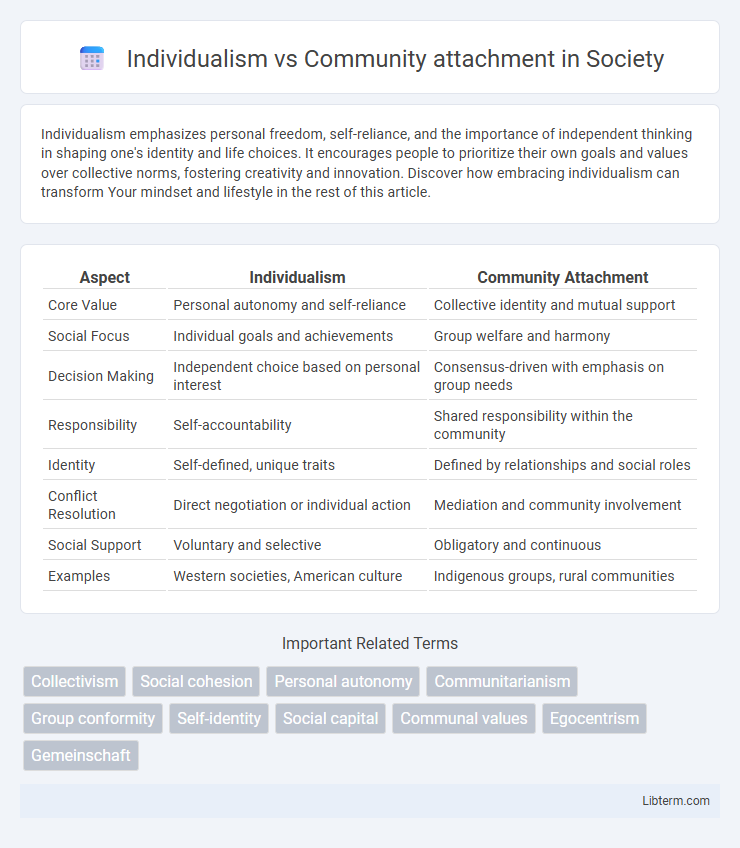Individualism emphasizes personal freedom, self-reliance, and the importance of independent thinking in shaping one's identity and life choices. It encourages people to prioritize their own goals and values over collective norms, fostering creativity and innovation. Discover how embracing individualism can transform Your mindset and lifestyle in the rest of this article.
Table of Comparison
| Aspect | Individualism | Community Attachment |
|---|---|---|
| Core Value | Personal autonomy and self-reliance | Collective identity and mutual support |
| Social Focus | Individual goals and achievements | Group welfare and harmony |
| Decision Making | Independent choice based on personal interest | Consensus-driven with emphasis on group needs |
| Responsibility | Self-accountability | Shared responsibility within the community |
| Identity | Self-defined, unique traits | Defined by relationships and social roles |
| Conflict Resolution | Direct negotiation or individual action | Mediation and community involvement |
| Social Support | Voluntary and selective | Obligatory and continuous |
| Examples | Western societies, American culture | Indigenous groups, rural communities |
Understanding Individualism: Core Principles
Individualism emphasizes personal autonomy, self-reliance, and the pursuit of individual goals, promoting a sense of freedom and responsibility. Core principles include prioritizing personal rights, independent decision-making, and valuing uniqueness over group conformity. This perspective shapes social, political, and economic systems that encourage personal achievement and limit collective control.
The Essence of Community Attachment
Community attachment embodies a deep sense of belonging and emotional connection to a particular social group or place, fostering shared identity and collective responsibility. It nurtures cooperation, social support, and cultural continuity, contrasting with individualism's emphasis on personal autonomy and self-reliance. The essence of community attachment lies in mutual trust and interdependence, which enhance social cohesion and overall well-being.
Historical Roots of Individualism and Community
Historical roots of individualism trace back to Enlightenment thinkers like John Locke, who emphasized personal liberty and self-ownership as fundamental rights. In contrast, community attachment originates from ancient tribal societies and feudal systems where identity and survival depended on collective cooperation and shared responsibilities. These divergent foundations shape contemporary debates on balancing personal autonomy with social cohesion.
Benefits of Embracing Individualism
Embracing individualism fosters personal autonomy, enabling people to make independent decisions that enhance creativity and innovation. It promotes self-expression and accountability, leading to increased motivation and self-esteem. This focus on individuality drives societal progress by encouraging diverse perspectives and solutions to complex problems.
Advantages of Strong Community Bonds
Strong community bonds foster social support networks that enhance mental health and resilience during crises. Collective efforts in communities improve resource sharing, safety, and local problem-solving, leading to increased well-being and stability. Research shows that individuals embedded in tight-knit communities experience higher life satisfaction and reduced feelings of isolation.
Tensions Between Personal Freedom and Collective Responsibility
Individualism prioritizes personal freedom, autonomy, and self-expression, often emphasizing the rights and interests of the individual over the group. Community attachment emphasizes collective responsibility, social cohesion, and mutual support, valuing the well-being and stability of the group as a whole. Tensions arise when individual desires conflict with communal obligations, prompting debates over the balance between personal liberty and societal duties in governance, ethics, and cultural norms.
Individualism vs Community in Modern Society
Modern society experiences a dynamic tension between individualism and community attachment, where personal autonomy often competes with collective well-being. Rising digital connectivity enhances individual expression but can weaken traditional community bonds, challenging social cohesion. Understanding this balance is crucial for fostering inclusive policies that respect personal freedoms while promoting communal support systems.
Cultural Perspectives on Individualism and Community
Cultural perspectives on individualism and community vary significantly, with Western societies often emphasizing personal autonomy, self-expression, and individual rights as core values. In contrast, many Eastern and Indigenous cultures prioritize community attachment, interdependence, and social harmony, viewing the collective well-being as essential to identity and success. These differing cultural frameworks shape social behavior, communication styles, and approaches to problem-solving across global populations.
Finding Balance: Integrating Self and Society
Finding balance between individualism and community attachment involves harmonizing personal autonomy with social responsibility. Emphasizing interdependence enhances psychological well-being while fostering collective resilience and social cohesion. Integrating self-expression alongside communal values promotes sustainable growth and inclusive cultural development.
Future Trends: Shifting Values in a Globalized World
Future trends in individualism versus community attachment reveal a dynamic tension shaped by globalization and digital connectivity, where the rise of personalized identities coexists with renewed emphasis on collective belonging. Emerging patterns indicate younger generations increasingly value diverse social networks and hybrid identities, blending local traditions with global perspectives. This shift fosters evolving social frameworks that balance autonomy and interdependence, influencing cultural norms, political participation, and social cohesion worldwide.
Individualism Infographic

 libterm.com
libterm.com